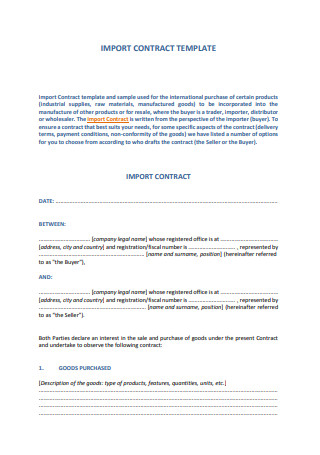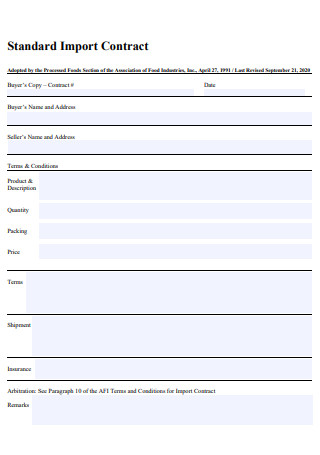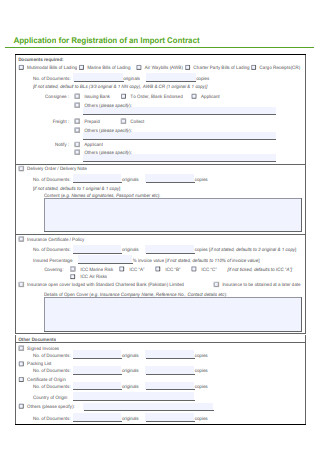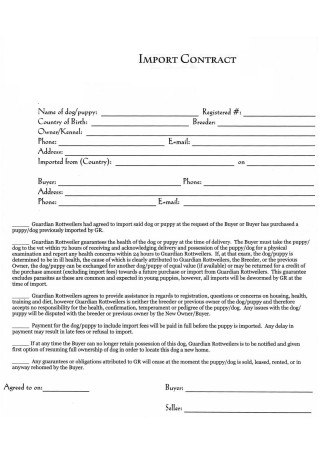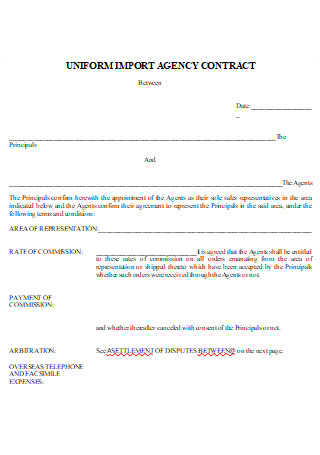4+ Sample Import Contract
FREE Import Contract s to Download
What Is an Import Contract?
An import contract is a legally binding document that includes information on the buyer and seller as well as the imported items. Import contracts also include terms and conditions that are acceptable to all parties involved. It’s essentially a sales agreement for a certain imported goods. It would specify the price and quality of the foreign products. This contract must also include contact information for both the seller and the buyer. Payment matters should be addressed in the contract as well.
Benefits of Importing
A trade is a trade. Importers make the same as exporters. Business plan workbooks will teach you that it’s all about making wise investments. Imports are also an investment. It must, however, be regulated. Countries can enter into exclusive importer agreements. Or from a corporation that imports from another country. There are always risks considering. However, it should be assessed considering data reports and analytical reports. If it is possible that an import will give more than take, then the opportunity should be taken. And here are some of the reasons why you should start importing.
Introducing New Products: Progress is often hindered due to a lack of competition. When a manufacturer, for example, has complete pricing power, there is no need to improve quality. It isn’t necessary because their product dominates the market. People cannot use comparisons to demand a greater level of quality. Manufacturing and supply may simply argue that it is already the best quality that present technology can provide. That is why there should always be a demand for new products. People should be given the chance to evaluate which option is best for them. Furthermore, the quality of imported products varies. There are occasions when domestic producers are unable to meet demand. It’s difficult for them to evolve when there’s nothing to compete with their products. Importing provides for the introduction of new products to the market. It generates variety in terms of both quality and quantity. This provides consumers with more options and choices. When they encounter foreign-made products, domestic entrepreneurs can broaden their horizons. Before importing a product, it seems sense to conduct market research on it. Higher Quality Products: Importing has resulted in more than just new products. Rather, it is the introduction of higher-quality products. This applies to both domestic and international producers. As previously noted, competitions tend to put producers on the spot about the quality of their products. And the market is always on the lookout for the greatest. There is only one way to solve this quandary: launch a higher-quality product. Imported goods are frequently of greater quality and at a lower cost. That is both a good and a bad thing. Consumers benefit, while local firms face significant challenges. It would, however, encourage domestic producers to improve their game. They face competition not just from home but also from overseas firms. It’s a study of ideas and countermeasures. Finally, the consumer benefits the most by receiving a higher quality product. Reducing Manufacturing Costs: Labor and manufacturing expenditures can be too expensive. A large amount of land, as well as the necessary equipment, must be purchased. Although, certainly, it does result in more job creation. However, in an entrepot commerce, it may be preferable to import cheaper raw resources from neighboring countries. Local produce does not always result in superior quality. Expensive heavy machinery is another problem. Costs could be reduced by importing huge quantities of a supply. This is a widespread issue in developing and impoverished countries. Labor could also be an issue. Both the budget and a skilled worker may be difficult to obtain. Especially if there is a broader and higher-paying opportunity available abroad. There are additional tax concerns to consider, as well as integrating modern techniques and infrastructure that prioritizes worker safety and health. This is not always truly the case. However, it will always be dependent on government backing. And the country’s and company’s capabilities. There is also a problem with obtaining resources and raw materials. This is subject to local supply. Access to Goods and Services: Importing goods from other countries would increase the diversity of identical products. It is beneficial to customers because they will have more options. It will also allow them to choose the best one for them. Foreign items do not always have a local equivalent. As a result, importing would provide domestic residents with the opportunity to purchase those products. And it’s even better when it’s sold at a lower price but of superior quality. It also opens the door to introducing novel goods. It may even motivate local producers to create their own version. The more products that arrive on the market, the greater the possibility of new novel ideas. Though novelty has lost its luster in this generation, inventive solutions have sprouted up in its place. Focus More on Local Specialties: It is always preferable for any company to use locally available resources. As a result, it does not need to import raw materials. Every country or city has its own specialty. A service or product that is only available in a specific location. Producers should take advantage of this opportunity. Rather than attempting to create or imitate international products, emphasis should be placed on regional specialties. Making use of your company’s or country’s ability to generate. This enables it to be exported to other countries. And only import things that are not available in your country. It is more efficient.
Top Import Products
Some countries are rich with raw minerals that are in high demand in everyday life. These countries can benefit from exporting these commodities. Though natural resources are limited, this does not limit a human’s hunger to exploit them. Do you want to know what the world’s top import products are? Worldstopexports.com has compiled a list of the World’s Top Import Products for 2019. Let’s discuss them more below.
Crude Oil: Crude oil is a type of natural petroleum resource. It is liquid and yellowish-black in hue. It is mined via oil drilling beneath the surface of a planet. It is one of the most desired products in the twenty-first century because it can be refined into any sort of fuel. It’s difficult to envisage a technology that doesn’t rely substantially on fuel. It is a significant energy resource for large countries such as the United States. Even “electric” vehicles are powered by electricity. Natural energy resources are both costly and scarce. Petroleum products derived from crude oil include gasoline, diesel fuel, jet fuel, and even asphalts. Furthermore, crude oil reservoirs are located deep underground. And Saudi Arabia has been the leader in oil exports. It is a highly profitable export. And it is required in everyday life. Companies would suffer financial losses if they did not have them. This is not an exaggeration. Integrated Circuits: We shall not proceed to a more technical explanation. Simply said, an integrated circuit is a microchip, or many small transistors integrated on a chip. And these little chips play an important function in current electronic devices. It is relatively tiny and easily mass-produced. They effectively enable electrical devices in functioning and operating. It is made up of diodes, transistors, and microprocessors. When combined, they aid in the operation of electrical gadgets. Every electrical equipment contains an embedded chip. And, as a result, demand is at an all-time high. Especially because there is a means to mass-produce them in vast quantities. These integrated circuits will be imported by countries that manufacture appliances. Cars and Car Parts: Automobiles have come a long way. From the first steam-powered automobile to electric vehicles. Cars have become a necessity and a source of convenience for most consumers. It provides ease and safety when traveling. There are more than 60 automobile brands in the globe. Every year, approximately 80 million automobiles are produced. That is a large number. Although there are many distinct types of motor vehicles, cars are by far the most popular. Some automakers purchase car parts from other firms. Others manufacture everything in their factory. There is always a demand for cars that are both safer and faster. Because of how motor vehicles have infiltrated sports, it has also become a challenge. Even if on a smaller scale, motorsports such as F1 have put automotive engineering to the ultimate test. Sports cars have become a status symbol for the wealthy. And typical cars enable a normal individual to get around more quickly and efficiently. Roads are being built everywhere, therefore automobiles and car parts will not be phased away very soon. Computers and Computer Parts: Computers, like automobiles, have become indispensable in the modern world. Computers that are faster and more efficient are in high demand. Almost all occupations rely on computers to function. They might take the form of Automated Teller Machines (ATMs) or small laptop computers and portable gadgets. Even more so for computer parts. Purchasing a new computer just due to faulty components is cost prohibitive. Signing a repair agreement is the better option. It may be necessary to modify or replace the component at times. And many people require computer repair for any device or computer. the demand for computer parts has increased. Computers have infiltrated Tournaments in the same way as cars have. Nowadays, there is so much competition that it is difficult to keep up. However, because of its great popularity, the audience is also encouraged to purchase better computers. It has become crucial in education and daily life. Medicine: Everywhere, medicine is vital. And in some cases, only certain parts of the world could mass-produce them. Those countries who cannot afford it will be forced to import from them. Particularly during a pandemic. Medicine and vaccines are in short supply. It is critical for countries to be supplied with medicine for hospitals to function. A contract between exporter and importer is essentially guaranteed. Since some drugs necessitate the use of modern labs, wealthy countries profit more from it. Quality control and production control are critical components of the pharmaceutical manufacturing process. It is not a smart idea to flood the market with untested drugs. It may do more harm than good.
Steps on How to Make an Import Contract
Making an import contract is comparable to making a trade deal. However, the import contract has fewer technicalities and rules. Import contract pdf are made in a straightforward manner.
-
Step 1. Buyer information
The contract should include information on the buyer. It contains information about the company as well as its address. Names and contact information are examples of personal information. In this part, the seller or exporter may also be required to include their contact information and address. It is critical to confirm the supplier from which the goods will be purchased.
-
Step 2. Goods or Product
The sort of goods or individual product should be specified. Also included is the quantity that would be ordered. The overall price, whether per piece or in bulk pricing should be stated as well. The goods description and its condition upon arrival too. Physical description and its operation and function should be included in the description.
-
Step 3. Terms and Conditions
It is critical to establish terms and conditions. When the goods have been delivered, these agreements may include a disclaimer. Or how obligation would not lie on the exporter in the event of damage. Some of these conditions pertain to undelivered or late payments. Terms referring on expected quality upon arrival, as well as warranty information.
-
Step 4. Payment
Following the establishment of pricing, the form of payment is the next step. Payment may be made in installments or in one lump sum. It should clarify payment deadlines, and what constitutes late payment. Also included are the terms for late payments and how both parties should handle reimbursement concerns. Payment does not have to be monetary; it might alternatively be in the form of a similar product exchange. Alternatively, you may provide a concession in exchange for a lower price.
FAQS
Why Is an Import Contract Important?
An import contract can aid in the establishment of import purchase order terms and conditions. This would entail product descriptions and pricing for the product to be imported. This would bind two parties to a legal agreement with repercussions if it was broken. It assures both parties that the agreement is mutually agreed upon. It also serves as a record for auditing purposes.
Is Manufacturing Better Than Importing?
It would all depend on which route consumed the least amount of money. Manufacturing a product can sometimes be riskier. Problems may emerge because of difficult-to-find or locally produced raw materials. Alternatively, some businesses may struggle to acquire all the essential equipment to begin manufacturing. Quality is also essential. And, on occasion, importing provides better and higher quality at a lower cost. Most manufacturers import raw materials or at least components of their products. Manufacturing creates jobs and saves money on tariffs. However, if foreign products have higher quality, then import may be a preferable option.
What Is an Import Licensing?
Import licensing is a technique or process that necessitates the submission of pertinent documentation prior to the importing of products into specific regions. Since various nations may have their own trade rules, documentation may be required to be provided. It also specifies the maximum number of imported commodities that can enter the country. Import licensing is a type of non-tariff trade barrier.
Import-export contracts are created to provide security and assurance. Both have advantages and disadvantages. It is a matter of selecting the best investment where profit can be achieved. Begin yours right away by downloading a sample import contract above!

